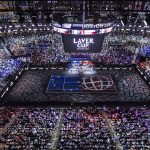Nike’s controversial “Dream Crazy” commercial featuring Colin Kaepernick won the Creative Arts Emmy for Outstanding Commercial.
The spot, created by the Wieden+Kennedy ad agency and produced by Park Pictures, premiered last September just before last year’s NFL season to both praise and outrage.
The commercial, part of Nike’s “Just Do It” 30th-anniversary campaign, was nominated alongside entries from Apple, Netflix, and Sandy Hook Promise—an organization against gun violence. It’s the first time Nike has won the award since 2002.
The two-minute piece included a number of Nike’s stars, including Serena Williams, LeBron James and the U.S. women’s soccer team, illustrating how athletes have defied expectations to make seemingly insane dreams a reality. But it caught the most attention for being narrated by Kaepernick, whose sideline protests against racial injustice during NFL games garnered widespread attention.
“Believe in something, even if it means sacrificing everything,” Kaepernick said in the ad, a reference to his decision to take a knee during the national anthem at NFL games in 2016 and risk his career.
The ad, revealing that Nike had extended its contract with the quarterback, prompted some consumers to call for a boycott and burn their Nike apparel in protest. Critics felt Kaepernick didn’t really “sacrifice everything” since he still has had already earned millions in his career while military members was willing to sacrifice their lives fighting for the country.
But several studies have shown Nike benefited from the free advertising and earned heightened credibility with younger consumers.
At a shareholder meeting on September 20 of last year, Mark Parker, the chief executive of Nike, called Kaepernick “one of the most inspirational athletes of our time.” A few days later he told Wall Street analysts on an earnings call that the casting of Kaepernick in its “Dream Crazy” spot had resulted in “record engagement with the brand.”
Kaepernick started in Super Bowl XLVII for the San Francisco 49ers in 2013 before struggling as opposing teams adapted to his style of play and who later lost his starting job in 2015 before his on-field protests began. He was released by the 49ers at the end of the 2016 season and hasn’t been signed by any other NFL teams. His collusion grievance against the league wasn’t settled until shortly after the Super Bowl five months after the spot premiered.















